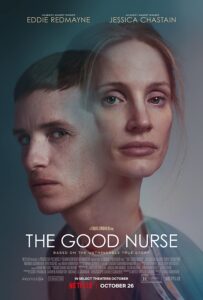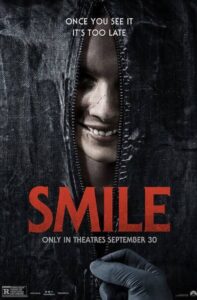 While Netflix offered its Dahmer – Monster: The Jeffrey Dahmer Story, a ten-part mini-series on, perhaps, America’s most notorious serial killer, the same company also brought to its streaming service, as well as to the big screen, a feature-lengthed film on lesser known, albeit more another prolific serial killer in Tobias Lindholm’s The Good Nurse. This review will undoubtedly contain spoilers. If you have yet to see The Good Nurse, I recommend a viewing, though I’ll caution that it operates slower than what you both wish and expect. I am uncertain if I would have given as invested in The Good Nurse had I watched it at home rather than at the theater. This is all to say that it deserves the attention the director, the writers, and the actors put into it.’
While Netflix offered its Dahmer – Monster: The Jeffrey Dahmer Story, a ten-part mini-series on, perhaps, America’s most notorious serial killer, the same company also brought to its streaming service, as well as to the big screen, a feature-lengthed film on lesser known, albeit more another prolific serial killer in Tobias Lindholm’s The Good Nurse. This review will undoubtedly contain spoilers. If you have yet to see The Good Nurse, I recommend a viewing, though I’ll caution that it operates slower than what you both wish and expect. I am uncertain if I would have given as invested in The Good Nurse had I watched it at home rather than at the theater. This is all to say that it deserves the attention the director, the writers, and the actors put into it.’
On the Count of Three (2021)
 The opening sequence of Jerrod Carmichael’s feature-length debut On the Count of Three shows a revolver being pointed inches from the face of Kevin (Christopher Abbott – It Comes At Night, First Man), a thirty-something man with swollen eyes and a twitching mouth that suggests that something terrible is about to happen to him. Then, the camera shifts to Val (Carmichael – Neighbors, The Disaster Artist), who has a similar firearm in his hand, pointing it at Kevin. Are these two men adversaries, attempting to make the other lower their gun with the threat to shoot?
The opening sequence of Jerrod Carmichael’s feature-length debut On the Count of Three shows a revolver being pointed inches from the face of Kevin (Christopher Abbott – It Comes At Night, First Man), a thirty-something man with swollen eyes and a twitching mouth that suggests that something terrible is about to happen to him. Then, the camera shifts to Val (Carmichael – Neighbors, The Disaster Artist), who has a similar firearm in his hand, pointing it at Kevin. Are these two men adversaries, attempting to make the other lower their gun with the threat to shoot?
Till (2022)
 As I watched the beginning of Chinonye Chukwu’s (Alaskaland, Clemency) true story Till, my mind kept returning to two different thoughts. The first was the film’s timeframe, thinking about my grandparents and realizing that the film’s lead character, Mamie Till-Mobley (The Harder They Fall, The Devil to Pay), was about the same age as my grandparents when the film took place (mostly) in 1955. The second was how I thought Till felt like a stage play, as much as it did a feature-length movie. I pondered how a live experience might feel. Sadly and shamefully, I only became aware of Emmett Till’s story for the first time when I saw the trailer. While I knew there were parts that I knew would be brutal, it was it wasn’t until we got to the film’s second act that I truly began to understand the story’s magnitude and felt that this story would be nearly impossible to pull off as a stage performance because of how draining it might be for the actors to go through the experience repeatedly, as well as how a live performance might devastate unprepared attendees.
As I watched the beginning of Chinonye Chukwu’s (Alaskaland, Clemency) true story Till, my mind kept returning to two different thoughts. The first was the film’s timeframe, thinking about my grandparents and realizing that the film’s lead character, Mamie Till-Mobley (The Harder They Fall, The Devil to Pay), was about the same age as my grandparents when the film took place (mostly) in 1955. The second was how I thought Till felt like a stage play, as much as it did a feature-length movie. I pondered how a live experience might feel. Sadly and shamefully, I only became aware of Emmett Till’s story for the first time when I saw the trailer. While I knew there were parts that I knew would be brutal, it was it wasn’t until we got to the film’s second act that I truly began to understand the story’s magnitude and felt that this story would be nearly impossible to pull off as a stage performance because of how draining it might be for the actors to go through the experience repeatedly, as well as how a live performance might devastate unprepared attendees.
Everything Everywhere All At Once (2022)
 Everything Everywhere All At Once has slowly and quietly followed the established template of A24, a studio known for releasing groundbreaking, original, and independent movies. Through initial word of mouth, the co-directed film by Dan Kwan and Daniel Scheinert (who also co-wrote), Everything Everywhere All At Once, has become a movie that everyone has at least heard of, even if it has not been seen. Other nonconventional A24 films that had a lot of buzz around them and ended up earning Best Picture nominations in the last half dozen years include Minari (2020), Lady Bird (2017), and Moonlight (the Best Picture winner of 2016). While I appreciated all three movies, I only enjoyed Moonlight. I know that many will die on the sword for Lady Bird. I was not one of those people. A growing number seem willing to do the same for Everything Everywhere All At Once. Again, I am not one of them. I found the story incredibly uneven, the pace hurried, and the narration unreliable.
Everything Everywhere All At Once has slowly and quietly followed the established template of A24, a studio known for releasing groundbreaking, original, and independent movies. Through initial word of mouth, the co-directed film by Dan Kwan and Daniel Scheinert (who also co-wrote), Everything Everywhere All At Once, has become a movie that everyone has at least heard of, even if it has not been seen. Other nonconventional A24 films that had a lot of buzz around them and ended up earning Best Picture nominations in the last half dozen years include Minari (2020), Lady Bird (2017), and Moonlight (the Best Picture winner of 2016). While I appreciated all three movies, I only enjoyed Moonlight. I know that many will die on the sword for Lady Bird. I was not one of those people. A growing number seem willing to do the same for Everything Everywhere All At Once. Again, I am not one of them. I found the story incredibly uneven, the pace hurried, and the narration unreliable.
Smile (2022)
 If watching the trailer for first-time feature director Parker Finn’s Smile evokes memories of a particularly disturbing videotape from an, at the time, unknown movie that had the casual horror filmgoing fan cowering their eyes behind their hands for the better part of two hours, it’s because it’s supposed to. I’m referring to, of course, the 2002 classic The Ring, and the comparison I’m making is the phone call the watcher receives after watching the videotape that tells them they have seven days to live. Likewise, the trailer for Smile informs us that when the viewer sees “it” (what “it” is, we are uncertain), they will soon die. While there are both similarities and differences between the two films, what is certain is that The Ring generated $129 million domestically at the box office, which Finn would gladly like to duplicate.
If watching the trailer for first-time feature director Parker Finn’s Smile evokes memories of a particularly disturbing videotape from an, at the time, unknown movie that had the casual horror filmgoing fan cowering their eyes behind their hands for the better part of two hours, it’s because it’s supposed to. I’m referring to, of course, the 2002 classic The Ring, and the comparison I’m making is the phone call the watcher receives after watching the videotape that tells them they have seven days to live. Likewise, the trailer for Smile informs us that when the viewer sees “it” (what “it” is, we are uncertain), they will soon die. While there are both similarities and differences between the two films, what is certain is that The Ring generated $129 million domestically at the box office, which Finn would gladly like to duplicate.